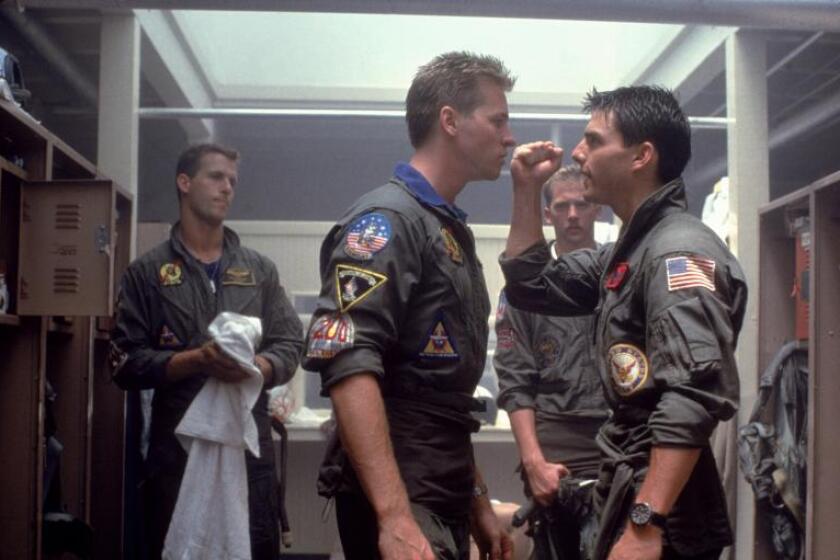MOVIE REVIEWS : ‘Miller’s Crossing’: Stylish but Remote
- Share via
“What’s the rumpus?” is the byword among “Miller’s Crossing’s” Jazz Age mobsters. What is the rumpus, anyway, about this elegiac, stylish gangster movie (selected theaters), the third feature from the brothers Coen?
The Coens--Joel directs, Ethan produces, they write together--love old movies. “Blood Simple” was their Hitchcock, their stark little black film, its tongue very slightly in its cheek. It put them on the map. “Raising Arizona” was their stupefyingly madcap comedy, and for all those to whom it gave blinding headaches, it also introduced Holly Hunter, fair return for a few aspirins.
With “Miller’s Crossing,” the Coens have turned to what they call the “dirty-town movie” of the ‘20s, full of casually violent gangster bosses, dangerous dames and ruthlessly tamped-down dialogue.
It’s a jump for them, in control and accomplishment, yet when you get past the luscious look of the piece and the roiling sound of its talk, it’s a chilly film and foolishly light in the upper story.
The Coens’ love for the movies of the past is respectful in a clinical, remote way, as though films were museum-quality clocks, not pulsing, soulful things, warm and even inconveniently messy at times. Self-conscious formalism has been the Coens’ signature. Before, when they’ve assembled their clockwork films, those movies--for all their puddling blood or wacko action--have been cool and smooth as plastic.
“Miller’s Crossing” certainly isn’t plastic. It’s dark and hushed as a men’s club; it almost smells of polished leather and pricey cigars. When it isn’t indoors, it’s in arching, cathedral-like woods. It has somber, poetic images and an especially fine musical score that braids its Irish themes together hauntingly.
Best of all, it has Albert Finney in a grand turn as Leo, the watchful Irish gangster boss. There is something about the sight of Finney, alone, at night and on the offensive, his cigar stub jammed into his dressing gown pocket, his crested slippers on his bare feet, his Thompson machine gun spitting sparks into the dark, that is breathtaking--as filmmaking and as characterization.
At Leo’s right hand is Gabriel Byrne as the inscrutable Tommy, the most savvy lieutenant a boss could want except for his lousy luck at gambling and his invariable success with the ladies--currently Verna, the lady of Leo’s heart (Marcia Gay Harden). As Verna’s brother, Bernie Bernbaum, there is John Turturro at his peak of smarmy perfection as a weasel only a sister could love, and you worry a little about her.
Yet anything this stylish should have something to say, and “Miller’s Crossing” is a declaration of serious but not altogether fathomable intentions. And unfortunately for a movie about friendship and loyalty, its diversions aren’t enough to melt its cold, cold heart.
Heart may be what the movie needs most, but a bit of clarity wouldn’t hurt either. Even here in gangsterland, where random characters are cherished and non sequiturs are considered wisecracks, there is a difference between complications and impenetrability, and this plot is a bloody thicket.
Broadly, the story revolves around Leo, Tommy and Johnny Caspar (Jon Polito). Caspar, the token Italian mobster, opens the film begging Leo for the right to kill Bernie, a bookie whom he calls “the schmatta “--Yiddish for rag . Seems every time Caspar fixes a fight, Bernie screws the odds, making the fix almost pointless.
But Leo won’t fork over Bernie, partly because he won’t be muscled, partly because Bernie is Verna’s brother, and Leo’s besotted with Verna. There is also the indelicate matter of Tommy and Verna, and Tommy, of course, is too honorable--or too something --to hide that forever. In the full-scale warfare that ensues, Tommy leaves Leo’s side to go over to a rival and Leo disappears from the screen, leaving a hole the size of Pennsylvania.
Byrne’s Tommy remains at the center of things, the movie’s iceman. He’s supposed to be the ultimate loner, his brain whirring faster than everyone else’s, his eyes shaded by that heavily symbolic hat. Byrne’s beaky, promising face can hold us, but not forever. He’s an opaque actor playing impenetrability, and it’s possible to get tired of peering behind his remoteness for a glimpse at whatever’s supposed to be inside.
It’s one of the movie’s heavy jokes that Tommy is sapped, kicked, gut-punched, choked, thrown down three flights of stairs and beaten almost into insensibility, only to bounce back in the next scene, unscathed. With this ongoing insider joke, the Coens have their laugh but lose their audience.
How are we supposed to react when realistic-seeming beatings don’t leave a mark on one man but turn another into bloody hamburger? Common sense finally rebels; empathy that’s been stretched thin by the film’s emotional remoteness evaporates. Considering the talents employed on both sides of the camera, it’s a bitter price to pay.
“You’re a lie and no heart,” Verna flashes at Tommy, but in nailing him she’s hit “Miller’s Crossing” right between the eyes.
More to Read
Only good movies
Get the Indie Focus newsletter, Mark Olsen's weekly guide to the world of cinema.
You may occasionally receive promotional content from the Los Angeles Times.








